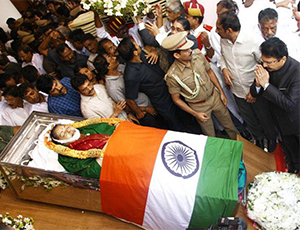Colombo/Kuala Lumpur, Dec 6: Leaders from countries that have a significant Tamil population like Sri Lanka, Malaysia and Singapore, including Lankan President Maithripala Sirisena, today condoled J Jayalalithaa's demise with the diaspora grieving the loss of their beloved leader.
"Chief Minister (Tamil Nadu) Jayalalithaa was a leader dearly loved by her people. I express my condolences to her loved ones and the people of Tamil Nadu," Sirisena said.
Former Sri Lankan president Mahinda Rajapaksa also offered his condolences, saying "she captured the hearts of India's Tamil community".
Rajapaksa, during his presidency, had invited Jayalalithaa to visit Sri Lanka to witness the post-war conditions. Jayalalithaa had a checkered relationship with Sri Lanka. While the Sinhala majority supported her strong anti-LTTE sentiments, they did not favour her for her pro-Tamil nationalist stance.
The Tamil minority in Sri Lanka favoured Jayalalithaa for her ability to pressure New Delhi to nudge Sri Lankan political leadership to grant concessions to Tamils. Singapore Foreign Affairs Minister Vivian Balakrishnan is travelling to Chennai to pay tributes to Jayalalithaa.
Balakrishnan willbe travellingwith hisMinistry officials, a government statement said.
According to official statistics, 74 per cent of Singapore's population is of Chinese ethnicity, while 13 per cent are of Malay heritage and 9 per cent of Indian, including Tamils.
In Singapore, Tamil is an official language along with English, Mandarin and Malay.Foreign Affairs Minister Balakrishnan was also born to a Tamil father. In Malaysia, the country's largest ethnic Indian party condoled Jayalalitha's demise, describing her as a "super woman".
"As we all know, the late J Jayalalithaa was a charismatic leader and had done a lot for the Indian people, especially concerning for welfare of the poor, the women and the marginalised community," said Vel Paari, Treasurer General of the Malaysian Indian Congress (MIC) and son of Samy Vellu, who served as MIC president for almost three decades.
Malaysia's Senate President S A Vigneswaran also expressed condolences over Jayalalithaa's death.
"I am very sad. All (of us) knew Jayalalithaa. She was also a famous actress. Hope the people (of Tamil Nadu) will be calm," he said.
Malaysia's 28 million population comprises 8 per cent ethnic Indians a majority of whom are Hindu Tamils. Their ancestors came to Malaysia more than 100 years ago and many were brought by the British.
In South Africa, the South African Tamil Federation (SATF) has called on all its affiliates across the country to host special prayer services for the late Tamil Nadu Chief Minister, describing her as "a friend of the Tamil community worldwide".





Comments
Add new comment